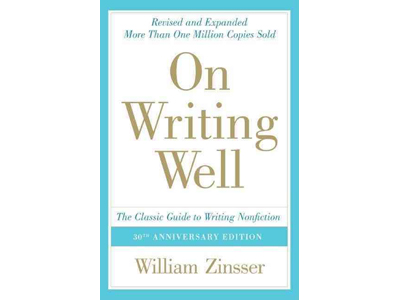
My friend recommended an excellent book on writing: “On Writing Well” by William Zinsser, and I finally started reading it.
It is a how-to writing book, teaching principles and techniques to whoever likes to take her or his writing to the next level. It’s exactly what I need.
More than a year ago, I started my daily doodling + writing practice that I call “A Doooodle A Day”. Many people told me that they loved those doodles, but for me, writing is the more important piece. After all, I doodle because I want to write daily — I can’t write easily without some visual elements helping me mark the progress. I enjoy flipping my sketchbook and remember the story I wrote for a specific day.
My improvement on writing is tremendous — for someone whose native language is not English. Aside from that, my oral English has improved a lot, too. I found it easier for me to chat with people on more topics for a longer time now. I’m very thankful.
However, several things have gradually become bottlenecks for me, like searching for topics to write, how to write it well and how to find interesting perspectives to write about. Now, I don’t want to write just for the sake of writing, it’s time to learn from writing experts, and get better in writing. As William said: “… with the arrival of the word processor, the opposite things happened: good writers got better and bad writers got worse. … bad writers became even more verbose because writing was suddenly so easy and their sentences looked so pretty on the screen.”
The journey of improving writing will be long, but I’m sure it will be fulfilling.
Craft & Attitude
Below is a paraphrase regarding the author’s words on a writer’s craft spirit and attitude. A writer needs to master his writing skills, so that she doesn’t lose readers through sloppy workmanship. This includes using appropriate expressions and correct syntax.
However, this doesn’t mean that this writer should use words or sentences that are so out if herself that readers can’t tell her personality. When a writer writes, she writes things that represent herself. Readers should feel that from the writing: is she naughty? Is she refreshing?
When you write, remember that you are writing for yourself. You are expressing yourself to the readers. So be true to yourself.
Word Choices
William said: “readers read with their eyes, but in fact they hear what they are reading far more than you realize.” That’s how people enjoy interesting sounds of words and rhymes.
He strongly opposes using “instant word patches”, which he calls “journalese”. An instant word patch example is using an adjective as a noun (“notable” -> “notables”), or using a noun as a verb (“host” -> “to host”). William thinks this way of word usage is cheap and lazy.
I’m not sure I agree with him on this. I always enjoy the expression “I shouldered my way…” because I can visualize someone is trying hard to get through something. I don’t think it’s absolutely necessary to stick to words that have been engraved in dictationaries for hundreds of years. Tweaking words creates new expressions and reflect our ever changing age.
Maybe I’m dumb and haven’t got the gist of word choices yet. It would be interesting to revisit this opinion in a few years.
Unity in Writing
William talks about 1. unity of pronoun – if you write in first person, then stick to it, do not switch to third person arbitrarily; 2. unity of tense, make sure the you write in a certain tense consistently throughout the essay; 3. unity of mood or tones, go with a casual voice or serious tone? Don’t mix them.
William gives a great example: if you write about an awesome trip you had with a friend, think about: what pronoun and tense you are going to use, what style it’s going to be, what attitude you are going to take toward the material, how much you want to cover and what one point you want to make.
to be continued…